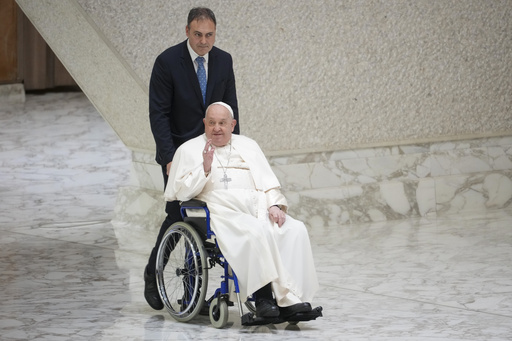ROME — On Monday, Pope Francis convened a significant summit aimed at enhancing the protection of children from war, forced labor, trafficking, and exploitation. This initiative highlights the urgency of upholding children’s fundamental rights globally, despite the Catholic Church’s troubled history regarding the safeguarding of minors from sexual abuse.
Queen Rania of Jordan opened the event, reflecting on the United Nations Convention on the Rights of the Child, which is recognized as the most widely ratified human rights treaty. However, she pointed out that the enforcement of its principles is often lacking. “In theory, the global consensus is clear: every right, for every child,” she stated at the meeting held in the Apostolic Palace. “Yet, so many children around the world are excluded from its promise—particularly in warzones. Worse yet, people have grown desensitized to their pain.”
She referenced a psychological study focused on children in Gaza, who have suffered through more than a year of the ongoing conflict, revealing that 96% believed their death was imminent and half expressed a desire for death. “How did we let our humanity come to this?” she lamented.
Senator Liliana Segre, a Holocaust survivor at 94 years of age, shared her experiences of being denied an education under Italy’s racial laws established in 1938, which prohibited Jewish children from attending school. “We were surrounded by an indifference that sometimes is worse than violence,” she recalled. Segre has dedicated her life to teaching young people about antisemitism and the importance of addressing injustices, often facing hostility for her advocacy. “I am the oldest woman in the world with a police escort and am insulted and threatened, despite not having done anything,” she shared.
Pope Francis outlined the dire conditions confronting countless children today, including conflict, homelessness, trafficking, and forced marriage. He also highlighted the plight of 150 million stateless children—those without birth registration or documents—stating that their lack of legal protection makes them vulnerable to abuse and exploitation. “This is an obstacle to their accessing education or healthcare, yet worse still, they can easily be abused or sold as slaves,” he emphasized.
He mentioned the Rohingya children in Myanmar and undocumented migrants crossing the U.S.-Mexican border as particular examples of vulnerable populations. “Those first victims of that exodus of despair and hope, made by the thousands of people coming from the South towards the United States of America, and many others,” he added.
Numerous speakers at the summit reiterated the core tenets of the U.N. Convention on the Rights of the Child, which was ratified by 196 nations. This treaty asserts fundamental rights for all children, including the right to life, nationality, freedom of thought and religion, health, and education. It mandates that signatory countries take necessary measures to protect children from harm and prioritize their well-being.
The Holy See ratified this convention in 1990. Yet, in 2014, the committee responsible for upholding the convention’s provisions voiced strong criticism of the Holy See due to the global sexual abuse scandals and requested progress reports by 2017. Unfortunately, many countries fail to meet such timelines, and the Holy See has not submitted an updated report since then.
In 2021, U.N. special rapporteurs raised concerns with the Holy See regarding ongoing instances of abuse, cover-ups, and interference with victims’ pursuit of justice for their experiences within the Catholic Church.



